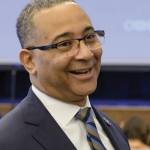Iqra Athar ’26
News Editor
Trinity College’s Allan K. Smith Center for Writing and Rhetoric has been awarded a $10,000 grant by the Center for Expanding Leadership and Opportunity (CELO) with support from the Allstate Foundation. This grant is part of a broader initiative aimed at redefining youth service and empowering community engagement across various colleges.
CELO, a nonprofit born from the Aspen Institute’s research, collaborates with the Allstate Foundation to distribute more than $1 million in college service grants annually. This year, Trinity is among 50 select colleges nationwide, including notable institutions like Cornell University and the University of Chicago, to receive these funds. The grants are aimed at supporting a range of initiatives from microgrants for student-led projects to enhancing the impact of existing service programs.
In an interview with the Tripod, James Truman, Director of Peer Tutoring at the Allan K. Smith Center, elaborated on the grant’s objectives. “This funding from CELO allows us to continue and expand our community outreach programs, primarily including our collaboration with Trinity’s office of community engagement, CHER and the Trinity Prison Education Project, to extend educational opportunities beyond our campus,” Truman stated. The grant will support the Center’s efforts to provide writing tutoring services both within the Hartford Correctional Center and for Hartford area high school students working on their college applications.
The grant specifically aids in facilitating sessions for Hartford area high school students through a partnership with the Trinity College Academy (HMTCA). These sessions focus on academic skills such as writing college essays and completing capstone projects. Liliana Polley, director of CHER strategic partnerships, highlighted the value of this initiative, stating, “CHER places Trinity College’s mission — to engage, connect and transform — at the heart of all our activities. Establishing and maintaining mutually beneficial relationships with the Hartford community is essential. Ensuring that the Hartford community has access to the college’s resources is a crucial aspect of fostering these meaningful relationships.”
The more substantial portion of the grant is directed toward the Trinity Prison Education Project (TPEP), which has been operational since 2012. TPEP provides incarcerated individuals with access to college-level, credit-bearing courses, initially at York Correctional Institution and more recently at the Hartford Correctional Center. Anna Terwiel, co-director of TPEP and assistant professor of Political Science, explained the expansion of their program: “Last academic year, we began offering classes at the Hartford Jail. This initiative makes us the only institution in Connecticut offering such educational services in state jails.”
The partnership between TPEP and the Writing Center at Trinity College has introduced an important component of academic support to the inmates. “Integrating the Writing Center into our curriculum has enriched the educational experience for the incarcerated students, offering them the same level of academic support as our campus students,” Terwiel added.
Discussing the logistics of the program, Truman provided insight into how the grant facilitates these educational outreach efforts. “Travel and resources are substantial constraints when extending our services to correctional facilities. This grant not only supports our ongoing projects but also enables us to potentially expand our reach to additional locations,” he said, appreciating the collaborative support from the grants office at Trinity that introduced him to this grant. “The Grants Office was incredibly supportive throughout the application process, providing feedback and guidance that were crucial in securing this grant,” Truman acknowledged.
This strategic enhancement of resources is poised to make a lasting impact on both the students and the community. “We’re not just providing writing support; we’re helping students shape their futures through education,” Truman reflected on the dual benefit for Trinity students and the broader community. The involvement extends beyond immediate educational support to fostering a deeper understanding among Trinity students about the carceral system, thus enriching their academic and personal growth.
Future plans for TPEP include exploring the potential of ‘Inside-Out’ classes, which would allow incarcerated and non-incarcerated students to learn together. This approach, according to Terweil, aims to break down barriers and foster mutual understanding, further integrating TPEP into Trinity’s curriculum: “With this grant, we hope to continue and enhance the involvement of the writing center in our programs, reaching more individuals and making education accessible to all.”



+ There are no comments
Add yours